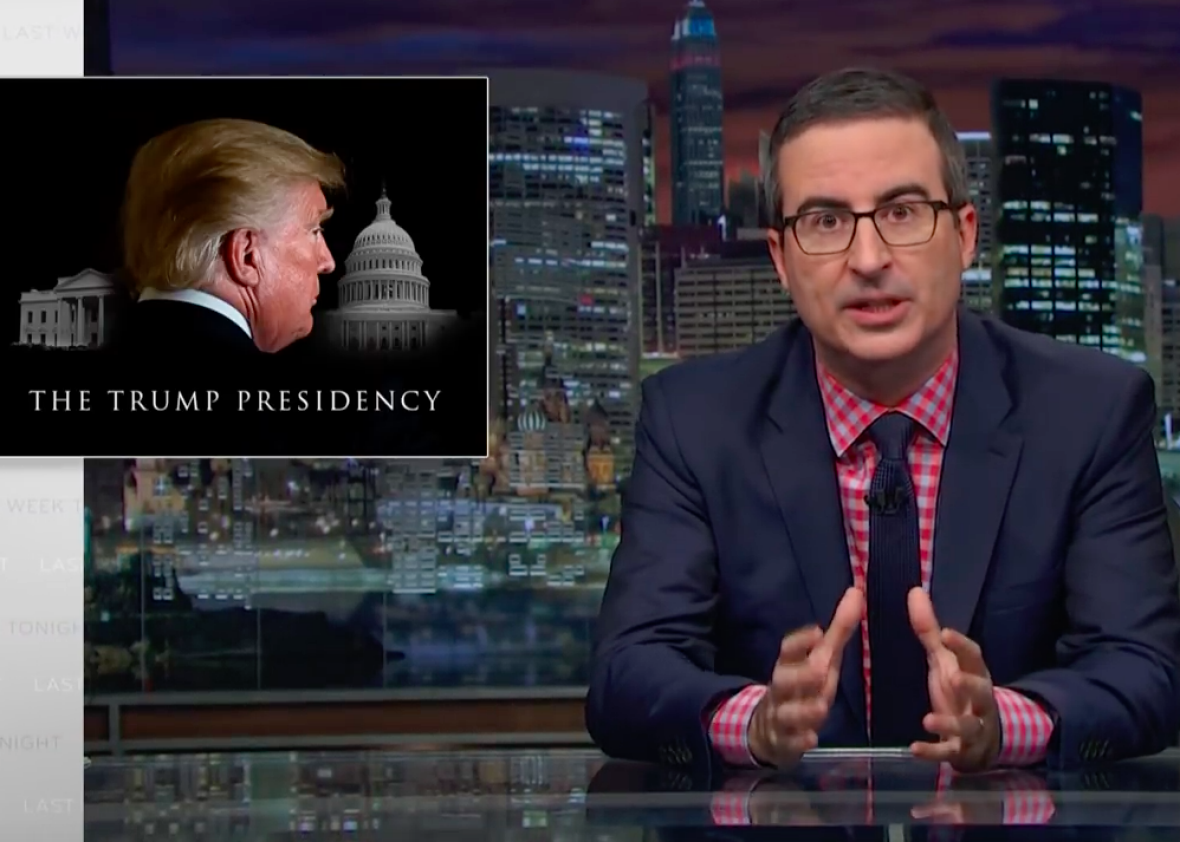John Oliver Examines How Trump’s First Year Has Already Changed Our Sense of “Normal”

Still taken from the video
Almost exactly one year ago, John Oliver sat down on Last Week Tonight to explain how “a Klan-backed, misogynist internet troll” could be successfully elected president of the United States. On Sunday, Oliver reflected on everything that’s happened since then, examining how the first year of the Trump presidency is already changing what we think of as “normal” for politics and in our own lives. Setting aside the more obvious broken norms, like a president not releasing his tax returns or hiring his daughter and son-in-law, Oliver instead looked at the ways Trump has altered “the norms governing how our leaders engage with us, and in turn, how that affects the way that we engage with one another.”
Oliver then outlined the three techniques Trump uses to deflect criticism, starting with ...
Delegitimizing the media. This one’s pretty self-explanatory, given that Trump has taken credit for coining the term fake news, which isn’t true, which makes that assertion, as Oliver pointed out, “fake ‘fake news’ news.”
Whataboutism. Trump—and Fox News, which is basically a window into Trump’s brain at this point—like to respond to criticism with “What about Hillary?” or “What about the alt-left?” This is famously a favorite Soviet propaganda tool that paints all actions as morally equivalent, which is part of what makes it so dangerous. “None of the errors people may have made in the past excuse the Trump administration’s actions,” said Oliver. “A defense attorney could not stand up in court and say, ‘Maybe my client did murder those people, but I ask you this: What about Jeffrey Dahmer?* What about Al Capone? What about the guy from Silence of the Lambs?’”
Trolling. This, of course, is Trump’s signature move. Trolling is a time-honored internet tradition, but Trump is truly our first troller in chief: Just look at his tweets about Mika Brzezinski, or CNN, or Kim Jong-un, or Puerto Ricans, or—you know what, just look at his Twitter account in general, OK?* Having a provocateur in the White House has had far-reaching consequences, suggests Oliver, since, while Fox and Friends may be giddy over Trump telling reporters that his meeting with military leaders is “the calm before the storm,” the rest of the country winds up feeling scared and confused.
While none of these techniques is new, they’re now spreading. “And if there’s one thing worse than something terrible, it’s a cover band of that terrible thing,” said Oliver. He used Alabama’s Senate candidate Roy Moore as an example. Moore called the claim that he had molested a 14-year-old girl as “fake news.” Then Sean Hannity derailed a discussion about the Moore allegations on Fox News by changing the subject to whether Bill Clinton should be considered guilty of predatory behavior. As Oliver pointed out, while that’s a discussion worth having, it’s totally unrelated to the matter at hand.
Oliver thinks it’s important to take note of these techniques, lest we get complacent as they subtly work their way into every aspect of the culture. “It’s like being murdered by a sloth,” said Oliver. “It happens very slowly, and you might not notice until it’s too late.”
*Correction, Nov. 13, 2017: This post originally misspelled Jeffrey Dahmer’s and Kim Jong-un’s last names.
